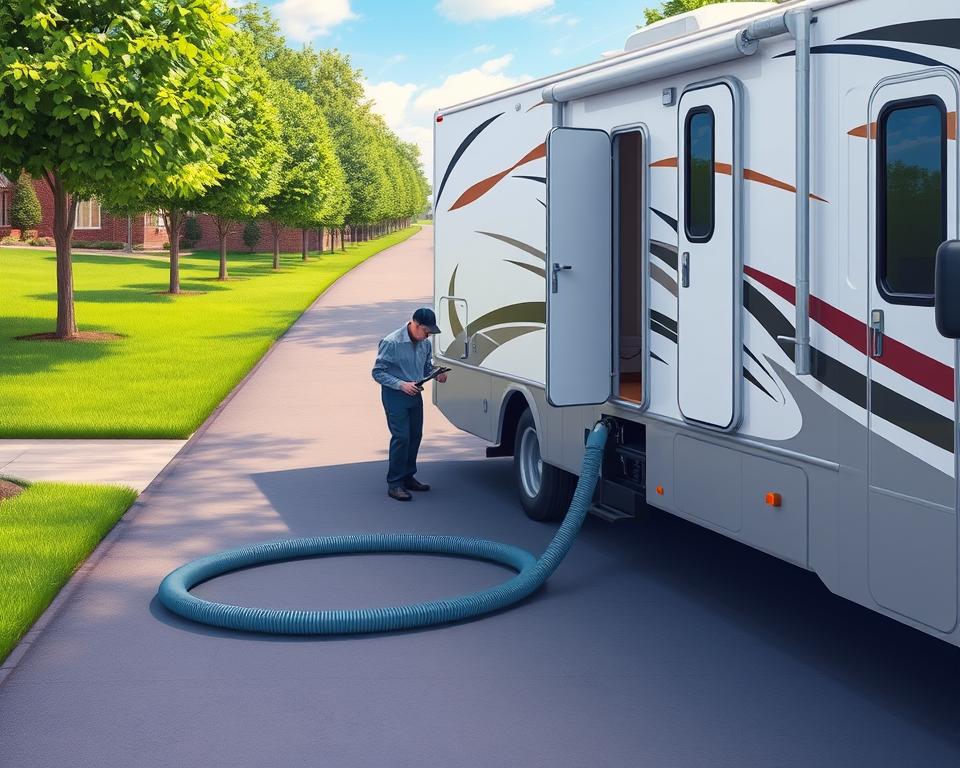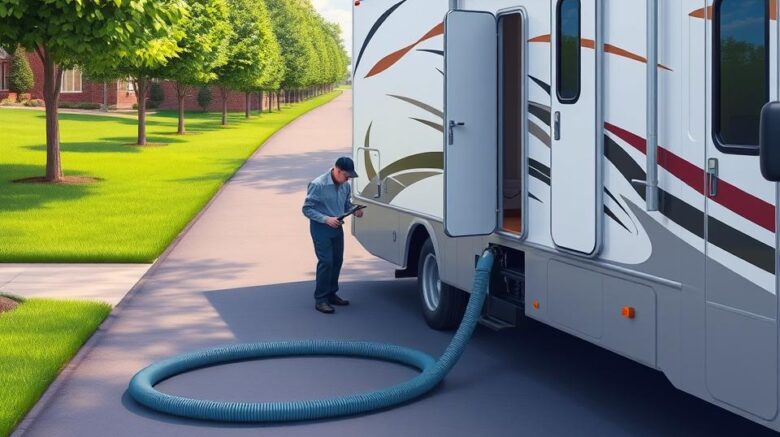RV Waste Pump: Key Upkeep Guidelines
Is your RV’s black water pump really road-ready, or might it create camping woes? Preserving your motorhome’s waste system in excellent order is imperative. It wards off foul odors, back-ups, and expensive damage. Below are indispensable advice to make sure your sewage pump runs seamlessly, making your travels peaceful.
Grasping Your RV’s Plumbing System
The RV plumbing system is crucial for any smooth journey. It separates into two main parts: the black water system and the gray water system – RV tank pumping service. The black water system gathers waste from the toilet, whereas the gray water system processes wastewater from sinks and showers.
The systems feature drain lines that direct toward different tanks, designed for efficient waste management. Each tank has a vent to avert gas from building up, ensuring the operation is safe and pleasant. Proper waste management in an RV is vital to sidestep leaks or bad odors. By familiarizing yourself with both black and gray water tanks, RV owners can service and manage waste better.
Knowing how your RV’s plumbing works lets you detect issues before they worsen. Regular maintenance makes trips smoother for everyone. Taking initiative with your RV’s plumbing system guarantees reliability during your travels.
RV Tank Categories
Operating RVs involves knowing the different tanks. Each one is vital to your RV’s operation, needing regular upkeep.
The fresh water tank stores drinking water. It’s critical for a pleasant RV experience.
The gray water tank holds sink, shower, and other non-Septic wastewater. Managing this tank keeps your RV hygienic while traveling. The black water tank, on the other hand, contains toilet waste. It needs consistent emptying and meticulous maintenance to avoid issues.
By learning about the fresh, gray, and black water tanks, RV owners can effectively manage their systems. This preparedness and ongoing maintenance guarantee smooth performance of the waste management system.
Black Tank Mechanics
The working of the black water tank is key in RV waste management. It stores waste from the toilet via a gravity-fed system. Upon flushing, waste and water are sent into the tank, to be stored until removal is necessary. It’s important to keep water levels optimized in the toilet to avoid solid waste buildup.
Grasping how RV waste tanks function can prevent clogs and odors. Without proper care, solid waste hardens, producing blockages and emptying difficulties. Effective tank flushing techniques are vital to preventing these issues, guaranteeing smooth functionality.
Consistent inspection of tank mechanics is advised for RV owners. This includes observing flushing methods and sustaining adequate water flow. Mastering these essentials supports efficient tank maintenance, dodging expensive fixes later.

Essential Maintenance Tips for Your RV Black Water Pump
Performing regular maintenance on your RV’s black water pump is critical. Begin with choosing RV-safe toilet paper to lessen clogs and improve flow. A complete flush can get rid of waste and diminish bad smells. Routinely cleaning the tank helps prevent residue buildup, ensuring your RV fresh and comfortable.
Run regular inspections to examine your pump’s condition. Inspect for any signs of wear or damage that could affect its function. Using specialized tank treatments, like those from All in Sanitation, can greatly boost both performance and cleanliness. Applying these tips can lengthen your pump’s life and upgrade your RV’s living conditions.
Select Camper-Safe Toilet Paper
Keeping your RV’s black water system necessitates important habits. One essential tip is using RV-safe toilet paper for clog prevention. This specialized product softens quickly in water, ideal for RV sanitation systems.
RV-safe toilet paper is paramount for tank maintenance. It dissolves fast, stopping blockages from slow-decomposing materials. This betters waste disposal efficiency and keeps the plumbing trouble-free.
Select brands labeled as RV-safe when buying toilet paper. These products lessen clog risks and increase your black water tank‘s lifespan by avoiding buildup. Continual use secures a stress-free camping experience, void of plumbing troubles.
Proper Tank Cleansing
Thoroughly flushing your black water tank is key for responsible waste management in your RV. To aid waste movement, ensure the toilet bowl is adequately filled before flushing. Many RVs are equipped with built-in tank flush systems to make the process more streamlined. For RVs without this feature, employing tank rinsers that attach to the sewer outlet offers a solid alternative.
Proper tank flushing assists waste removal and wards off solid accumulations and bad smells. Continuing this process ensures your RV stays pleasant, making your travels more pleasant. A commitment to regular and complete tank flushing will upgrade hygiene and the overall condition of your RV’s plumbing system.
Stop Residue via Frequent Cleaning
Keeping your RV’s black water tank clear is key for its efficient function. Consistent cleaning washes away lingering waste inside the tank walls. This means scouring well with water and using specific RV tank cleaners for tough deposits.
By cleaning often, you halt odors and minimize clog risks. A well-maintained tank makes RVing better and helps your plumbing last longer. Add tank maintenance into your routine to secure smooth travels.
Choosing Proper Chemicals
Choosing correct chemicals for RV black water pump maintenance is vital for managing waste and reducing smells. Many RV enthusiasts use enzyme-based RV holding tank treatments. These products feature good bacteria to break down solids and cut down bad odors.
Keeping away from harsh chemicals is important to prevent damage to your plumbing. Such substances can erode pipes, leading to pricey replacements and diminishing your RV enjoyment. Employing safe chemicals for odor control secures your tank and pump’s longevity.
Preserving your RV black water tank in excellent order improves your travel experience. Using the right holding tank treatment consistently ensures your system works well.
Proper Dumping Schedule
It’s crucial to empty your RV’s black water tank at the right time for smooth emptying. Make it a goal to empty when the tank is about two-thirds full is wise. This avoids solid waste buildup, providing a quicker emptying process.
Dumping at designated stations is imperative for safe, eco-friendly waste handling. It’s vital to keep an eye on the tank‘s levels closely. Letting it max out can cause clogs and make disposal more difficult.
Appropriate scheduling and techniques are crucial for hygienic waste management and can extend your plumbing’s life. Remaining attentive and doing proper upkeep delivers a pleasant RV living experience.
Seal Inspection and Upkeep
Examining seals around the toilet and tank is crucial for leak prevention. Over time, these seals might degrade, leading to odors and potential harm. A comprehensive inspection will reveal any wear or damage. Spotting issues early makes possible quick replacement to secure a secure connection and odor-free RV.
Keeping a bit of water in the toilet bowl supports in preserving seal condition. This safeguard is key in RV seal upkeep. It extends the seals’ life, avoiding leaks and foul odors.
Periodic seal maintenance can avoid expensive repairs later. By focusing on seal health, RV owners deliver a pleasant journey.
Long-Term Care Suggestions
Setting up professional servicing for your RV at least once a year is prudent, particularly for black water tank care. This strategy supports identifying problems early and upholds your plumbing system’s integrity.
When preparing your RV for storage, thoroughly clean and empty the black water tank first. Use antifreeze to guard against damage from remaining water during cold seasons. Taking this step is essential for protecting the system, ensuring it’s ready for your next adventure.
Regular inspections and preventive actions are essential to extending your sanitation system’s life. Inspecting connections, hoses, and seals ensures smooth operations. This method improves your RV experience, making it enjoyable all year round.
Guaranteeing your RV’s black water pump is well-maintained is essential for a stress-free camping journey. By sticking to the maintenance tips shared, you can keep your black water system working efficiently. It’s key to focus on routine washing, employing correct flushing methods, and picking appropriate chemicals for waste management.
By meeting these maintenance requirements, you will sidestep unpleasant odors and blockages. This also increases your RV plumbing system’s durability. Proactive care of the RV black water pump yields more time enjoying the outdoors, minus potential setbacks.
Remember, proper upkeep is key next time you gear up for an outing. It’s not the highlight of RV ownership, yet it significantly betters your travel experience.
